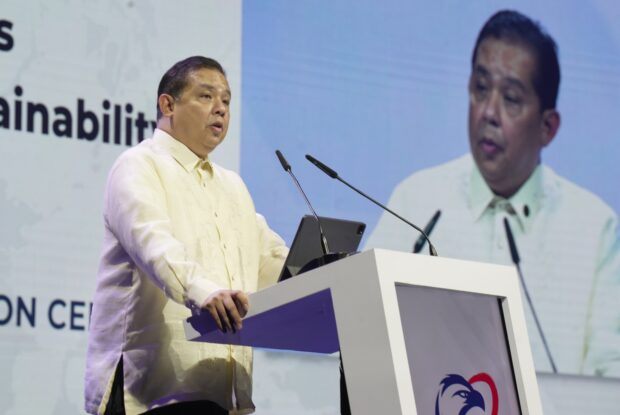
House Speaker Ferdinand Martin Romualdez delivers his welcoming message in this file photo taken on November 23, 2023, during the Asia Pacific Parliamentary Forum in Pasay City. (Photo from office of the Speaker)
MANILA, Philippines — House Speaker Ferdinand Martin Romualdez appealed to the Department of Transportation (DOTr) to extend the implementation of the public utility vehicle (PUV) modernization program until the concerns of jeepney drivers and operators are taken care of by the government.
Romualdez said in a statement on Thursday that he “strongly advocates for measures that protect the livelihoods of our jeepney drivers,” which includes the provision of more aid for them to transition to new vehicles through more “affordable financing options” and the provision of training programs so that drivers can “adapt to new technologies.”
The Speaker said this even as PUV operators and drivers, who have not complied with the consolidation requirement under the modernization program, get a month-long reprieve, or until the end of January 2024.
“Moreover, we are exploring avenues to provide fixed income opportunities for drivers. This move aims to stabilize their earnings, helping them to plan and secure their financial futures more effectively. We believe that a stable income will not only benefit the drivers but will also contribute to a more organized and reliable transport system,” Romualdez said.
“Until these measures aimed at protecting our jeepney drivers are set in place, I appeal to the Department of Transportation to conduct a complete review of the modernization program and extend the period of its implementation,” he added.
READ: PUV operators get month-long reprieve
Furthermore, Romualdez also said he has asked the House committee on transportation chairperson to do a motu proprio investigation regarding claims that corrupt activities have tainted the PUV modernization program.
The House committee on transporation is headed by Antipolo 2nd District Rep. Romeo Acop.
“I will also call on the Chairman of (the) House Committee on Transportation to conduct a motu propio investigation into reports received by my office that corrupt practices may have tainted the conceptualization and planned implementation of the jeepney modernization program,” Romualdez said.
“The reports allege that existing transport officials are in cahoots with previous officials in negotiating for the imported modern jeepney units that will replace the old units,” he added.
According to Romualdez, while it is important for the country to make changes that would translate to having modern and environment-friendly transportation systems, it is important to ensure that modernization would not hit jeepney drivers — which he called the backbone of the local industry for decades.
“The iconic jeepneys have long been a symbol of our nation’s vibrant culture and enduring spirit. As we embrace progress and innovation, it is imperative that we address the need for modern, efficient, and environmentally friendly transport systems. The jeepney modernization program is not just about upgrading vehicles; it’s a comprehensive plan to rejuvenate our urban transportation landscape, making it safer, more reliable, and in tune with sustainable practices,” he said.
“However, it is crucial to acknowledge that at the heart of this modernization are the jeepney drivers – the hardworking individuals who have been the backbone of our local transport industry for decades. Their welfare is our primordial concern. As we transition to modernized jeepneys, we recognize the challenges faced by drivers and operators,” he added.
Romualdez also said that moving towards modernization does not mean leaving the welfare of jeepney drivers behind.
READ: PUV modernization: Understanding defiance of operators, drivers
“While we stride towards modernity and efficiency, we remain steadfast in safeguarding the welfare and livelihood of our jeepney drivers, who are an integral part of this journey. Together, we can achieve a transportation system that is reflective of the Philippines’ growth, respecting our traditions while paving the way for a more sustainable future,” he noted.
READ: Labor group fears fare hike, job loss due to PUV modernization program
During the tail end of 2023, several transport strikes were held in protest of the government’s PUV modernization program, which will eventually phase out old and dilapidated jeepneys, including those whose engines do not conform with latest environment standards.